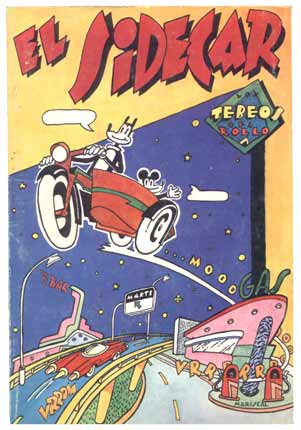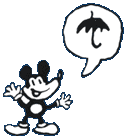Comic art by Javier Mariscal.
Javier Mariscal was born in 1950 in Valencia as Javier Errando, near the Mediterranean Sea. Using his mother's family name Mariscal for his artistic activities, he settled in Barcelona in 1970. There, he shortly attended the Elisava School and formed the underground comix group El Rrollo Enmacarado, together with Miquel Farriol Vidal, Max, Montesol, Pepichek, Nazario, Antonio Pamies and Roger.
Mariscal published his work in comic publications like Paupérrimus, Purita, Star, Grandes Hombres, El Sidecar and Art Dégénéré, as well as in his collective's own comic El Rrollo Enmascarado until they were censored by the Franco regime. Mariscal, who had also been active as a sculptor and painter around that time, moved to Ibiza for a while.
Comic art by Javier Mariscal.
When Franco died in 1975, Mariscal found his way to the new wave of alternative comic magazines that emerged. He was one of the artists for El Víbora, the magazine for which he revived his earlier comic characters 'Los Garriris', about two beach goers and their dog. Mariscal uses these characters to this day, not only in comic strips, but also in illustrations, brand images, merchandising, painted glass objects and pottery.
'A Valenciaa' (1975).
Artistic differences drifted him away from El Víbora in the 1980s, and Mariscal developed himself into a multi-faceted artist, creating paintings, ceramics, designing furniture, decorating bars (such as The Duplex in Valencia) and painting kitchen interiors. In 1989, he was assigned to design the mascot for the 1992 Olympic Games in Barcelona, which became 'Cobi'. Mariscal opened his own Estudio Mariscal to manage the business sides of his activities. Since then, Mariscal has worked on several projects with designers and architects such as Arata Isozaki, Alfredo Arribas, Fernando Salas, Fernando Amat and Pepe Cortés.
'Menjant Pollastre'.
In addition to all his other artistic activities, Mariscal continued to make comics, such as his 1990s ecological comic strip 'El Señor Mundo' for El País. By 2010 Mariscal finished his animated feature length film 'Chico & Rita', a celebration of the music and culture of Cuba in the late 1940s and early 1950s.
'El Sidecar'.
Mariscal and his studio worked on this film for six years in cooperation with with director Fernando Trueba, scriptwriter Ignacio Martinez de Pison, co-director Tono Errando (Mariscal's brother), Cuban musician Bebo Valdes and Hungarian and Filipino animation studios. A graphic novel version was also released.
Estudio Mariscal.







